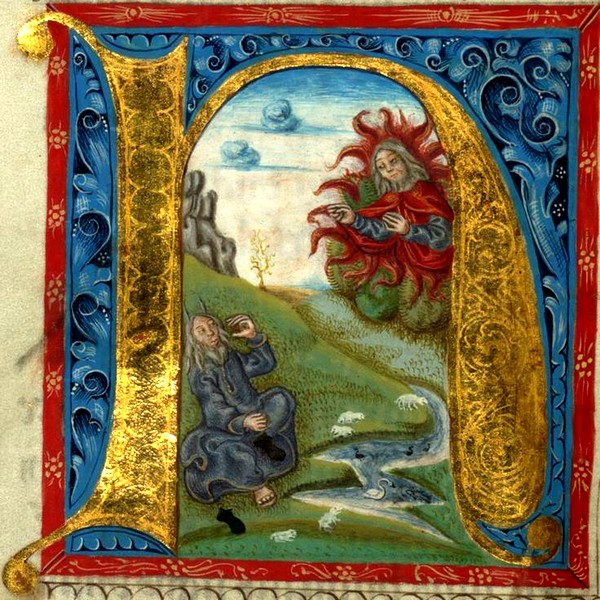
Moses before the burning bush. Bible, Dated February 2, 1507 CE, Ms
If the Enlightenment is the reason, Romanticism is fantasy. If the Enlightenment is being awake, Romanticism is dreaming. If the Enlightenment is the light, Romanticism is darkness. If the Enlightenment is the day, Romanticism is the night. During Romanticism, the night becomes a symbol, the mysterious world where everything that reason can't explain is possible; Night and dreaming are the doors to the real word, while the day hides the real sense of existence. This few lines tell, very roughly, why night is so important in Romantic poetry, in opposition to light, essential only a few years before. I would say that this significance goes beyond Romanticism, until the beginning of the 20th century (as evolved as times demand). And if the night is one of the most important topics of poetry, so it is of Lied. A quick review of the page We listened to shows us more than forty songs about night, so, in Liederabend's alphabet, N is for Night.
What is your favorite song about the night? If I had to choose just one, it would be Mondnacht. Schumann captures so accurately the peace expressed in Eichendorff's poem that it would be difficult to find one song more beautiful, moving or perfect. But why should we choose just one? Another of my favorite nights is An den Mond in einer Herbstnacht, where the moon goes with the wanderer and reaches what he can't: the places of his childhood, his friends and everything he loves. The last verse of this Lied speaks of death as rest, like two other essential Lieder about night: Nachtstück or Beim Schlafengehen. And if the heart needs some rest, dreams will alleviate the suffering until the sun rises again, as it happens in Nacht und Träume or Abendlied. The night is a time for meditation, rest or peace, but also for love, time to sing serenades such as those of Schubert and Strauss or, as in Die Nacht, to take advantage of the twilight, the perfect excuse for embrace your lover...
Did you noticed that when poets want to disturb us don't usually talk about night but about twilight? Maybe because during this time when day and night join together, we can't see clearly, shapes blur and we feel more vulnerable. In the magnificent Im Walde. Friedrich Schlegel, one of the first Romantic poets, sets us in the middle of the forest at dawn; our senses sharpen and Franz Schubert draws us with one of his most powerful songs. Maybe the opposite side of Mondnacht?
Finally, I would like to gaze at the stars. City people are no used to night, we don't know darkness or moonlight, even less stars. There are no stars in the city. At least we can listen to them, when we ask them for help, consolation or protection. And we can hear them smiling: are there more wonderful stars than those of An die Geliebte? That's why among all the songs I thought of while writing this post (so many that I gave up jotting them) I chose a starry night that comforts a wanderer.
This time the wanderer is not German but Scottish, Robert Louis Stevenson. He suffered since his childhood a serious lung disease that confined him to bed for long periods of time, but his frail health didn't prevent him from travelling throughout the word, he had a passion for travel. He came from a family of engineers and he also worked as an engineer for some time; This allowed him to travel across Scotland, as his family built lighthouses. When he left engineering, he studied Law to please his father, but he never practised and enterely devoted to travelling and writing. First, through France and Belgium; a while later he travelled to San Francisco following who would become his wife, Fanny van de Grift (a married woman, ten years older than him and with two children) and eventually settled in Samoa, where he died in 1894, at 44. Shortly before he sent to his publisher a volume of forty-four poems, Songs of Travel and other verses (finally published in 1896) where he insisted on his favorite subjects: trips and adventures.
A few years after the publication of the Stevenson's book, between 1901 and 1904, Ralph Vaughan Williams chose nine of these poems for his Songs of Travel. I'll talk about this song cycle in more detail another day; today I just wanted to share with you the sixth song of the cycle, The infinite shining heavens, in the beautiful version of Bryn Terfel and Malcolm Martineau. Even if it's daytime or you're in the city, you just have to pay attention to see the stars that twink and give peace to the wanderer.
The infinite shining heavens
The infinite shining heavens
Rose, and I saw in the night
Uncountable angel stars
Showering sorrow and light.
I saw them distant as heaven,
Dumb and shining and dead,
And the idle stars of the night
Were dearer to me than bread.
Night after night in my sorrow
The stars stood over the sea,
Till lo! I looked in the dusk
And a star had come down to me.












